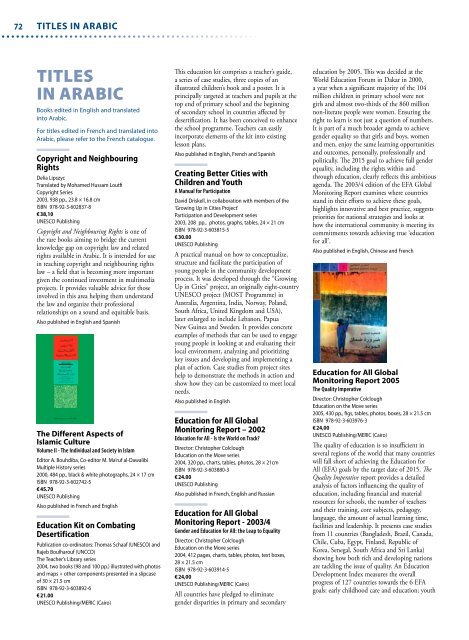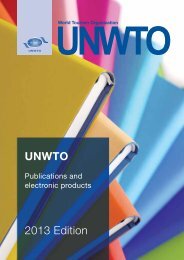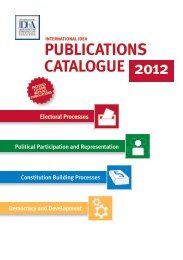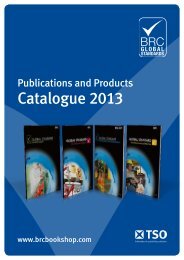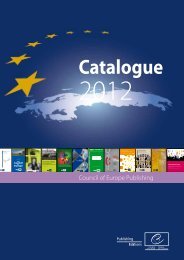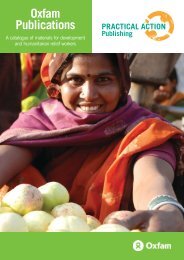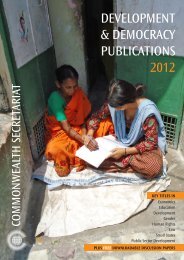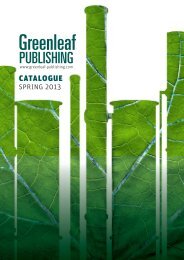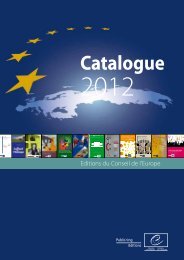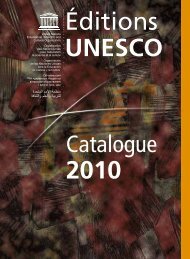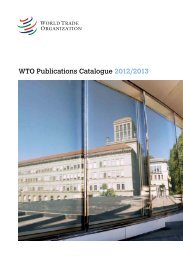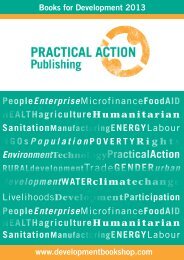UNESCO 2010/11 - Renouf Publishing Co. Ltd.
UNESCO 2010/11 - Renouf Publishing Co. Ltd.
UNESCO 2010/11 - Renouf Publishing Co. Ltd.
You also want an ePaper? Increase the reach of your titles
YUMPU automatically turns print PDFs into web optimized ePapers that Google loves.
72 TITLES IN ARABIC<br />
TITLES<br />
IN ARABIC<br />
Books edited in English and translated<br />
into Arabic.<br />
For titles edited in French and translated into<br />
Arabic, please refer to the French catalogue.<br />
<strong>Co</strong>pyright and Neighbouring<br />
Rights<br />
Delia Lipszyc<br />
Translated by Mohamed Hussam Loutfi<br />
<strong>Co</strong>pyright Series<br />
2003, 938 pp., 23.8 × 16.8 cm<br />
ISBN 978-92-3-602837-8<br />
€ 38,10<br />
<strong>UNESCO</strong> <strong>Publishing</strong><br />
<strong>Co</strong>pyright and Neighbouring Rights is one of<br />
the rare books aiming to bridge the current<br />
knowledge gap on copyright law and related<br />
rights available in Arabic. It is intended for use<br />
in teaching copyright and neighbouring rights<br />
law – a field that is becoming more important<br />
given the continued investment in multimedia<br />
projects. It provides valuable advice for those<br />
involved in this area helping them understand<br />
the law and organize their professional<br />
relationships on a sound and equitable basis.<br />
Also published in English and Spanish<br />
The Different Aspects of<br />
Islamic Culture<br />
Volume II - The Individual and Society in Islam<br />
Editor A. Bouhdiba, <strong>Co</strong>-editor M. Ma’ruf al-Dawalibi<br />
Multiple History series<br />
2000, 484 pp., black & white photographs, 24 × 17 cm<br />
ISBN 978-92-3-602742-5<br />
€ 45.70<br />
<strong>UNESCO</strong> <strong>Publishing</strong><br />
Also published in French and English<br />
Education Kit on <strong>Co</strong>mbating<br />
Desertification<br />
Publication co-ordinators: Thomas Schaaf (<strong>UNESCO</strong>) and<br />
Rajeb Boulharouf (UNCCD)<br />
The Teacher’s Library series<br />
2004, two books (98 and 100 pp.) illustrated with photos<br />
and maps + other components presented in a slipcase<br />
of 30 × 21.5 cm<br />
ISBN 978-92-3-603892-6<br />
€ 21.00<br />
<strong>UNESCO</strong> <strong>Publishing</strong>/MERIC (Cairo)<br />
This education kit comprises a teacher’s guide,<br />
a series of case studies, three copies of an<br />
illustrated children’s book and a poster. It is<br />
principally targeted at teachers and pupils at the<br />
top end of primary school and the beginning<br />
of secondary school in countries affected by<br />
desertification. It has been conceived to enhance<br />
the school programme. Teachers can easily<br />
incorporate elements of the kit into existing<br />
lesson plans.<br />
Also published in English, French and Spanish<br />
Creating Better Cities with<br />
Children and Youth<br />
A Manual for Participation<br />
David Driskell, in collaboration with members of the<br />
'Growing Up in Cities Project'<br />
Participation and Development series<br />
2003, 208 pp., photos, graphs, tables, 24 × 21 cm<br />
ISBN 978-92-3-603815-5<br />
€ 30.00<br />
<strong>UNESCO</strong> <strong>Publishing</strong><br />
A practical manual on how to conceptualize,<br />
structure and facilitate the participation of<br />
young people in the community development<br />
process. It was developed through the “Growing<br />
Up in Cities” project, an originally eight-country<br />
<strong>UNESCO</strong> project (MOST Programme) in<br />
Australia, Argentina, India, Norway, Poland,<br />
South Africa, United Kingdom and USA),<br />
later enlarged to include Lebanon, Papua<br />
New Guinea and Sweden. It provides concrete<br />
examples of methods that can be used to engage<br />
young people in looking at and evaluating their<br />
local environment, analyzing and prioritizing<br />
key issues and developing and implementing a<br />
plan of action. Case studies from project sites<br />
help to demonstrate the methods in action and<br />
show how they can be customized to meet local<br />
needs.<br />
Also published in English<br />
Education for All Global<br />
Monitoring Report – 2002<br />
Education for All - Is the World on Track?<br />
Director: Christopher <strong>Co</strong>lclough<br />
Education on the Move series<br />
2004, 320 pp., charts, tables, photos, 28 × 21cm<br />
ISBN 978-92-3-603880-3<br />
€ 24.00<br />
<strong>UNESCO</strong> <strong>Publishing</strong><br />
Also published in French, English and Russian<br />
Education for All Global<br />
Monitoring Report - 2003/4<br />
Gender and Education for All: the Leap to Equality<br />
Director: Christopher <strong>Co</strong>lclough<br />
Education on the Move series<br />
2004, 412 pages, charts, tables, photos, text boxes,<br />
28 × 21.5 cm<br />
ISBN 978-92-3-603914-5<br />
€ 24,00<br />
<strong>UNESCO</strong> <strong>Publishing</strong>/MERIC (Cairo)<br />
All countries have pledged to eliminate<br />
gender disparities in primary and secondary<br />
education by 2005. This was decided at the<br />
World Education Forum in Dakar in 2000,<br />
a year when a significant majority of the 104<br />
million children in primary school were not<br />
girls and almost two-thirds of the 860 million<br />
non-literate people were women. Ensuring the<br />
right to learn is not just a question of numbers.<br />
It is part of a much broader agenda to achieve<br />
gender equality so that girls and boys, women<br />
and men, enjoy the same learning opportunities<br />
and outcomes, personally, professionally and<br />
politically. The 2015 goal to achieve full gender<br />
equality, including the rights within and<br />
through education, clearly reflects this ambitious<br />
agenda. The 2003/4 edition of the EFA Global<br />
Monitoring Report examines where countries<br />
stand in their efforts to achieve these goals,<br />
highlights innovative and best practice, suggests<br />
priorities for national strategies and looks at<br />
how the international community is meeting its<br />
commitments towards achieving true ‘education<br />
for all’.<br />
Also published in English, Chinese and French<br />
Education for All Global<br />
Monitoring Report 2005<br />
The Quality Imperative<br />
Director: Christopher <strong>Co</strong>lclough<br />
Education on the Move series<br />
2005, 430 pp., figs, tables, photos, boxes, 28 × 21.5 cm<br />
ISBN 978-92-3-603976-3<br />
€ 24,00<br />
<strong>UNESCO</strong> <strong>Publishing</strong>/MERIC (Cairo)<br />
The quality of education is so insufficient in<br />
several regions of the world that many countries<br />
will fall short of achieving the Education for<br />
All (EFA) goals by the target date of 2015. The<br />
Quality Imperative report provides a detailed<br />
analysis of factors influencing the quality of<br />
education, including financial and material<br />
resources for schools, the number of teachers<br />
and their training, core subjects, pedagogy,<br />
language, the amount of actual learning time,<br />
facilities and leadership. It presents case studies<br />
from <strong>11</strong> countries (Bangladesh, Brazil, Canada,<br />
Chile, Cuba, Egypt, Finland, Republic of<br />
Korea, Senegal, South Africa and Sri Lanka)<br />
showing how both rich and developing nations<br />
are tackling the issue of quality. An Education<br />
Development Index measures the overall<br />
progress of 127 countries towards the 6 EFA<br />
goals: early childhood care and education; youth


